
Janie and Charlotte, good friends from college who have gone their separate ways politically, try to be reasonable about some hot-button issues. We’ve talked about religious freedom, the proper role of government, and state-supported health care. Then . . .
Janie: So here’s what happened: I threw you a short list of topics, and you chose this one. Thanks a lot!
Seriously, I haven’t said much about this subject because I don’t keep the figures and stats on hand (figures and stats tend to fall out of my head anyway). But it strikes me that a lot of people who debate this question do so on the grounds of broad principles, not precise numbers, and broad principle is where it starts anyway. So I can do that.
As you suggested, we may have area of broad agreement here. So let’s see—as a way of opening the discussion, which of these statements would you agree with?
- No nation in the history of the world has been more open to immigration than the United States.
- The Statue of Liberty symbolizes the mission of the U.S. to offer a home to the homeless, a new start for the destitute, and a shelter for the oppressed.
- Legal immigration is not a problem, but illegal immigration is, and can become an even bigger problem.
- Sanctuary cities are in violation of the U.S. Constitution.
- The rule of law is a casualty of our incoherent immigration policies.
I realize some of these statements can be interpreted different ways, and some of them can be qualified on a scale of 1 to 10. Feel free to throw some statements and/or questions my way, too, and we might choose the most contentious as a way to start.
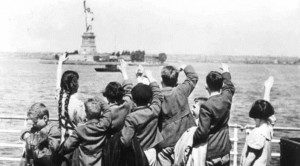
Charlotte: This is what you get for letting me choose the topic. Ha! You are very welcome!
Okay – I’m good with this approach, so here’s my quick response to your five points. Then we can continue the conversation by unpacking the “contentious” ones.
- No nation in the history of the world has been more open to immigration than the United States.
This may well be true; the USA has done a remarkable thing. Not exactly a “melting pot;” it’s more like a fascinating “buffet.” However, there is some ugly history that we need to discuss, especially since our entrenched national bigotry continues to affect immigrants today. (see point 5)
- The Statue of Liberty symbolizes the mission of the U.S. to offer a home to the homeless, a new start for the destitute, and a shelter for the oppressed.
Give me your tired, your poor, your huddled masses yearning to breathe free; the wretched refuse of your teeming shores.
Send them – the homeless, tempest-tossed – to me.
I lift my lamp beside the golden door.
I LOVE this! I typed it out without even googling it because the words are fixed within me from the time I sang this song with the passion of a young, idealistic girl. But if this is the “mission” of the US, it is an aspirational one, a high ideal because we both know the Statue of Liberty bears no legal weight.
- Legal immigration is not a problem, but illegal immigration is, and can become an even bigger problem.
 I think you mean that people who immigrate through the legal process are not a problem. I agree with this. BUT the immigration laws as they currently function in the US are definitely a problem. (see point 5)
I think you mean that people who immigrate through the legal process are not a problem. I agree with this. BUT the immigration laws as they currently function in the US are definitely a problem. (see point 5)
Also, many people initially came to the US through legal means but have overstayed their limit. Most of these people are hard working, law abiding, tax paying contributors to our society. (Here is a Pew Research Center article with some interesting charts and graphs about the current situation.)
But yes, there is definitely a practical problem of what to do now. Deport 11 million people? Rip apart loving families, separating mothers from their children and removing the financial and emotional support of fathers/husbands? Find a way to incorporate them and help them become citizens? Yes, I see this as a huge problem that needs practical solutions grounded in compassion. But I’m guessing this kind of problem is not what you are referring to. Help me understand.
- Sanctuary cities are in violation of the U.S. Constitution.
This one made me suck my breath in. What on earth are you talking about?!?
Sometimes laws are just flat wrong. Sometimes Supreme Court decisions are wrong. Protesting and resisting unjust laws is the DNA of Americans arising from foundational acts of the Founders of this nation.
- The rule of law is a casualty of our incoherent immigration policies.
I don’t know what you mean by this one either, even though I heartily agree we all suffer from incoherent policies in numerous ways – immigration being only one. Actually many of our laws are incoherent as well as our policies and (as laws always have) they can reflect cultural bias and even bigotry.
Consider the plight of African Americans, for example. 12 million human beings were legally imported as slaves, legally defined and generally considered to be not completely human, legally restricted from becoming citizens even though they were born on American soil. Finally, in 1868 the 14th Amendment of the Constitution was passed in order to remedy the “rule of law” that held sway in many states.
I include a link here to a helpful article if you are interested in reading it. One quote:
By the early twenty-first century, the first section of the Fourteenth Amendment served as the basis for a broad range of protections extended to both citizens and immigrants in the United States.
Non-citizens as well as citizens have rights under the US Constitution.
I hear Conservatives talk about “the rule of law” quite often. Please tell me what this means to you.
Janie: All of my original propositions are debatable, and I’m still thinking through them. For instance:
1) If the US is not THE most welcoming nation in the history of the world, it’s certainly the largest and most prominent. You don’t have to remind me about ugly history. Ugly history is everywhere—all nations have had their blind spots and national sins, as do we. Some of our vices owe to our virtues—if Americans did not recognize early on that our harbors should be open to later arrivals from other countries, walls would have gone up and ships turned away from the very beginning. But immigration has been our history from the start, and in its very nature—shifting demographics, gullible foreigners making for easy prey, native fears, evolving law—abuses developed as well as benefits. To my knowledge, no nation (except Canada, to an extent) ever tried to populate itself with large numbers of immigrants. The process wasn’t flawless, but taken overall it was an amazing success.
2) Is it the mission of the United States to offer a home for the homeless, etc.? No. The mission of any  nation is to sustain itself and its citizens. That said, the US is different from most nations because of its founding on a set of ideals that have a lot to do with benefitting mankind. The mission expressed by Emma Lazarus is a secondary principle developing from our first principles of liberty and equality, and her words have a strong appeal. (I don’t have to look them up, either—memorized them in sixth grade back when kids still had to memorize stuff.) They’re beautiful words. But not the primary mission of the USA.
nation is to sustain itself and its citizens. That said, the US is different from most nations because of its founding on a set of ideals that have a lot to do with benefitting mankind. The mission expressed by Emma Lazarus is a secondary principle developing from our first principles of liberty and equality, and her words have a strong appeal. (I don’t have to look them up, either—memorized them in sixth grade back when kids still had to memorize stuff.) They’re beautiful words. But not the primary mission of the USA.
3) I think we agree, at least in part, on what “the problem” is: what to do about people who didn’t go through the legal hoops to get here, as well as those who have overstayed their visas. By and large, they aren’t criminals; they’re good folks who are looking for opportunity and a decent paycheck. Can’t blame anybody for that. So there’s a problem of people, but there’s also a problem of policy, and of not being able to talk about immigration reform without one side being accused of mean-spiritedness. The term “anti-immigration” is a case in point. Conservatives by and large are not anti-immigration—most of them are descended from immigrants like everybody else and recognize the importance of immigration in our history. We’re willing to revise the laws as long as the laws are followed (and seem reasonable and safe!). But a swirling dust storm of inflammatory rhetoric from both sides obscures the issue enough so that nothing can be done about it. The confusing messages going over the border are not fair to immigrants, either, many of whom risk their lives to get here only to be turned away or put on hold.
4) Okay, so I looked it up: what, exactly, is a sanctuary city? My impression was it’s a municipality that declines to come under federal oversight in deporting overstays or identifying criminals. It’s more complicated than that—in fact, it’s pretty darn unclear exactly what a sanctuary city is. If it’s a city that refuses to enforce federal law, that strikes me as unconstitutional because immigration is a federal matter. But that’s one of the many murky areas that need to be clarified.
5) Rule of law: this might be where most of our discussion centers. It was John Adams, I believe, who coined the phrase, “A nation of laws and not of men,” by which he meant the government should respond to written precept rather than the opinions and ideas of whoever happened to be in power. I’m sure he was realistic enough to know that the law was occasionally going to be ignored, overstepped, and misinterpreted, but with a solid enough foundation the US could still avoid sliding into monarchy or dictatorship, where whoever held the power made the rules.
Third-world countries often operate like that: their laws sound just and fair but everybody knows the only way to get ahead is by and sucking up to the big boys, whoever they are. That is rule by men. Governing by misuse of executive order is also rule by men. Making law from the bench based on the majority of nine black-robed jurists is also rule by men.
There have been unjust laws and there always will be. The only way to correct unjust law, though, is by just law—overturning, not overruling. Legislative remedies are slow but they keep the structure in place; extra-legal remedies eventually break it down. And sidestepping or ignoring the law altogether, as when immigration laws are not enforced, leads to confusion, suspicion, and cynicism.
That’s what just happened with Trump’s revised executive order: the Fourth Circuit overruled it with, as I understand it, invalid reasoning—reasoning based on what candidate Trump said during the campaign rather than clear constitutional guidelines on what a president has the authority to do. I’m not a fan of Trump, or of that particular order, but court decisions like that may do more long-term damage to the system than an ill-conceived executive order.
I’ll concede that non-citizens have certain rights—as human beings, of course they do. But it’s unclear how far they extend. Should we talk about that next?
Charlotte: Again, thanks for this conversation, Janie. I find I have much to talk about here.
For starters, you say: “The mission of any nation is sustain itself and its citizens.” Maybe. I offer that, in particular, part of the key mission of the United States of America, as stated in our Constitution, is “to establish justice” and “promote the general welfare.” This mandate applies to all persons and not just citizens. (see below)
You say: “By and large, [undocumented immigrants] aren’t criminals; they’re good folks who are looking for opportunity and a decent paycheck.”
I can’t tell you how glad I am to hear you say this. You probably know, one of my “jobs” is to follow comments on a large political discussion Facebook page and I confess I grow so weary of the ugliness and hard heartedness of too many Conservative commenters. Many of these folks define “criminal” as any kind of law breaking, and so by virtue of the fact that anyone is living within our borders without proper documentation makes them “criminals” and the only proper response is to deport them. This group insists on nouning these human beings as “illegals.” I’m sorry, but these kinds of comments do feel “mean spirited” to me. So again, thank you for your compassion. I wish I could believe most Conservatives think as you do.
I agree that the “swirling dust storm of inflammatory rhetoric from both sides” complicates our ability to converse. Conservative accusations that all Liberals want open borders are ludicrous and offend me. I can see how Liberal labeling like “anti-immigration” would offend you. As I said at the outset, I really believe this is an issue in which we probably share much agreement. I believe if Liberals and Conservatives would speak gently and listen deeply to one another, we could find some sturdy places from which we can build solutions.
That said, our current president has intentionally basked in the power of inflammatory rhetoric. Suggesting that large groups of people – simply because of their ethnicity or religion – are “criminals, drug dealers, rapists” or “terrorists” is grossly irresponsible. Following his lead, too many elected officials have made outrageous comments about immigrants (and even American citizens!) How are we ever going to pull off immigration reform if so-called public servants refuse to serve the public good and continue to stoke the fires of fear against anyone who is “other?!” These are far and away Republican spokespersons and I hold Republican voters responsible to stand up them and demand civility and bipartisan cooperation.
Secondly, you say about sanctuary cities: “If it’s a city that refuses to enforce federal law, that strikes me as unconstitutional because immigration is a federal matter.” We are on thin ice here because neither one of us is a Constitutional expert. In some ways, this is over our pay grade.
Even so, every citizen should remember that the Founders originally did not write the Constitution to apply to cities and states; the US Constitution is the law of the land, of the nation. And yes, citizenship and immigration are the purview of the federal government. So again, it was the 14th Amendment that extended national citizenship to former slaves and thus states’ laws were overturned (to the ongoing chagrin of too many unrepentant confederate loyalists.) Since then the 14th Amendment has appropriately (in my understanding) addressed numerous areas where states’ laws were not providing “equal protection” for all persons. So now yes, increasingly, states have greater obligation to adhere to the US Constitution.
(Look over this explanation from the Constitution Center to see how Constitutional law has evolved over time. The Constitution doesn’t just mean what it says; it means what the Supreme Court says it means. This is my paraphrase of Justice John Marshall’s famous quote in Marbury v. Madison. I think this topic definitely needs more discussion.)
So where do sanctuary cities fit into all of that? Beats me. We’ll see what the Courts do with this. But, for me, as a Christian, such protection for the vulnerable is a foundational tenet, no matter what civil law says. And for me as an American, I would have been proud to provide sanctuary for the Suffragettes and the Underground Railroaders and the Sitters at the Woolworth counters. Protecting those who protest unjust laws is a good and noble thing in my mind. Sometimes the process for overturning unjust law demands and includes such bold resistance.
You reluctantly concede that non-citizens have basic human rights but question how far those rights extend legally. Here’s a helpful article from Forbes that discusses some of the history of the development of legal rights for non-citizens. It is much broader than many “rule of law,” Constitutional Conservatives think it is. Yes, let’s go there for our next conversation. I’ll begin and get something to you very soon.
Janie: A couple of points, and we can wrap this up. We often hear that the U. S. is a “nation of immigrants,” and that’s true as far as our ancestry goes. But a few years ago a conservative writer (I forget who) made what I believe is a necessary correction: we are a nation of citizens. Assimilation is key. In the naturalization ceremony, newly-minted American citizens are asked to renounce their former allegiances and promise to support the laws, ideals, and founding documents of the United States. To the extent that anyone is willing to do this, they are welcome, and most conservatives would agree. (I might suggest that Facebook is not the best place to evaluate conservative thought. I certainly don’t go there to figure out what progressives are thinking!)
What some of us fear is allowing in more immigrants, “legal” and not so much, who do not subscribe to American ideas and want to change it to something else. Or they’re coming for welfare benefits or criminal activity or outright subversion. These are the minority, I know, but there are significant numbers to cause concern. Stronger border security and vetting would alleviate some of these fears if we could settle down long enough to stop insulting each other and make some reasonable compromises. I can compromise on amnesty, for example, if we could get a more secure border.
Rule of law, judicial review, Constitutional protections for non-citizens—all sufficiently weighty, wormy, and worthy of discussion. Have at it!


 remaking it. ** They are, in ascending order of venality, Filostrato, Straik, Wither, and Frost. (Feverstone belongs to a group of one, and Hardcastle is a special case.) To understand them, we should look at Lewis’s conclusion at the end of “The Way”:
remaking it. ** They are, in ascending order of venality, Filostrato, Straik, Wither, and Frost. (Feverstone belongs to a group of one, and Hardcastle is a special case.) To understand them, we should look at Lewis’s conclusion at the end of “The Way”:


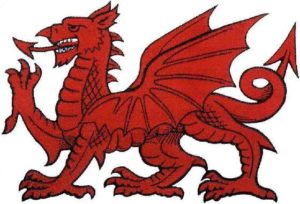

 “the Head” is, but Lewis is not going to spring it just yet. The conversation between Wither and Hardcastle hints that Mark was invited to the Institute not for his writing ability but for his wife—certainly the last thing he would have expected, and we should be rather surprised, too.
“the Head” is, but Lewis is not going to spring it just yet. The conversation between Wither and Hardcastle hints that Mark was invited to the Institute not for his writing ability but for his wife—certainly the last thing he would have expected, and we should be rather surprised, too.
 In February of 1943 C. S. Lewis delivered three evening lectures at King’s College in Newcastle. Later that year the lectures were published in book form under the title of the third: The Abolition of Man. Over time Lewis came to regard this slender volume as his most significant work. It’s very short, only 91 pages plus an appendix. You could read it in an evening–but don’t. It’s incredibly packed: every sentence could be pondered over or discussed in an evening’s literary circle.
In February of 1943 C. S. Lewis delivered three evening lectures at King’s College in Newcastle. Later that year the lectures were published in book form under the title of the third: The Abolition of Man. Over time Lewis came to regard this slender volume as his most significant work. It’s very short, only 91 pages plus an appendix. You could read it in an evening–but don’t. It’s incredibly packed: every sentence could be pondered over or discussed in an evening’s literary circle. two visitors besides Coleridge at a certain well-known tourist attraction, one of whom said the waterfall was sublime and the other said it was pretty. The poet mentally endorsed Tourist A—“sublime” was the proper value given to such a sight, while “pretty” was wholly inadequate. But G & T informed the young readers that value statements have no objective reality: isn’t one man’s sublime another man’s pretty? Thus, statements about feelings, metaphysics, or religion are meaningless in the public square, and the sooner English schoolboys and girls learn the difference between fact and value (and disregard the latter) the better off we’ll all be.
two visitors besides Coleridge at a certain well-known tourist attraction, one of whom said the waterfall was sublime and the other said it was pretty. The poet mentally endorsed Tourist A—“sublime” was the proper value given to such a sight, while “pretty” was wholly inadequate. But G & T informed the young readers that value statements have no objective reality: isn’t one man’s sublime another man’s pretty? Thus, statements about feelings, metaphysics, or religion are meaningless in the public square, and the sooner English schoolboys and girls learn the difference between fact and value (and disregard the latter) the better off we’ll all be.


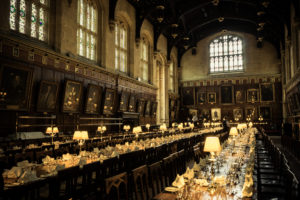

 “On the whole, novels are better when there are no miracles in them.” That said, he was ready to give a grudging thumbs-up to C. S. Lewis’s latest work of fiction, which completed the trilogy begun with Out of the Silent Planet and continued in Perelandra. Orwell summarized the story as “the struggle of a little group of sane people against a nightmare that nearly conquers the world. A company of mad scientists—or perhaps they are not mad, but have merely destroyed in themselves all human feeling, all notion of good and evil—are plotting to conquer Britain, then the whole planet, and then other planets, until they have brought the universe under their control.” He describes it as essentially “a crime story, and the miraculous happenings, though they grow more frequent towards the end, are not integral to it.”
“On the whole, novels are better when there are no miracles in them.” That said, he was ready to give a grudging thumbs-up to C. S. Lewis’s latest work of fiction, which completed the trilogy begun with Out of the Silent Planet and continued in Perelandra. Orwell summarized the story as “the struggle of a little group of sane people against a nightmare that nearly conquers the world. A company of mad scientists—or perhaps they are not mad, but have merely destroyed in themselves all human feeling, all notion of good and evil—are plotting to conquer Britain, then the whole planet, and then other planets, until they have brought the universe under their control.” He describes it as essentially “a crime story, and the miraculous happenings, though they grow more frequent towards the end, are not integral to it.” Lewis could say why this is wrong: It’s because humanity is made in God’s image, a little lower than the angels, the object of a massive, age-old, ultimately successful rescue operation. A miraculous rescue. That’s why THS ends positively, while 1984 is a total downer.
Lewis could say why this is wrong: It’s because humanity is made in God’s image, a little lower than the angels, the object of a massive, age-old, ultimately successful rescue operation. A miraculous rescue. That’s why THS ends positively, while 1984 is a total downer. Lewis’s near-dystopia is ruled by scientism. Our own world is apparently up for grabs. The federal government, by seizing more power for itself, threatens to kill by kindness, i.e., “taking care” of us until we’re drained of initiative. All of these systems diminish humanity by aggrandizing themselves.
Lewis’s near-dystopia is ruled by scientism. Our own world is apparently up for grabs. The federal government, by seizing more power for itself, threatens to kill by kindness, i.e., “taking care” of us until we’re drained of initiative. All of these systems diminish humanity by aggrandizing themselves.


 a surging mass of elements, or the back of a very large turtle. Ancient Egyptians, Sumerians, Africans, Meso-Americans and indigenous tribes the world over would have been quite puzzled at the idea of speaking light with no obvious light source. God doesn’t get around to creating the sun until Day Four—is this not an anomaly? So I asked, when old enough to understand what “anomaly” was.
a surging mass of elements, or the back of a very large turtle. Ancient Egyptians, Sumerians, Africans, Meso-Americans and indigenous tribes the world over would have been quite puzzled at the idea of speaking light with no obvious light source. God doesn’t get around to creating the sun until Day Four—is this not an anomaly? So I asked, when old enough to understand what “anomaly” was.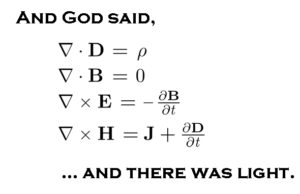

 too many men gather around the hyper-masculine president while he’s signing a bill. Patriarchy deserves no respect. The new definition is toxic masculinity, two words that tell you all you need to know about the proper way to think about what we used to call a “man’s man” or “all boy.” It’s not that we’re down on men, just that they need to stop being men, for their own good. “Toxic masculinity” is killing people, and the toxic males themselves are primary victims.
too many men gather around the hyper-masculine president while he’s signing a bill. Patriarchy deserves no respect. The new definition is toxic masculinity, two words that tell you all you need to know about the proper way to think about what we used to call a “man’s man” or “all boy.” It’s not that we’re down on men, just that they need to stop being men, for their own good. “Toxic masculinity” is killing people, and the toxic males themselves are primary victims. 


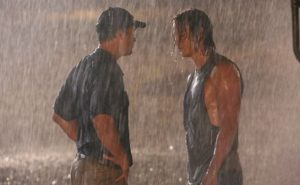


 I think you mean that people who immigrate through the legal process are not a problem. I agree with this. BUT the immigration laws as they currently function in the US are definitely a problem. (see point 5)
I think you mean that people who immigrate through the legal process are not a problem. I agree with this. BUT the immigration laws as they currently function in the US are definitely a problem. (see point 5) nation is to sustain itself and its citizens. That said, the US is different from most nations because of its founding on a set of ideals that have a lot to do with benefitting mankind. The mission expressed by Emma Lazarus is a secondary principle developing from our first principles of liberty and equality, and her words have a strong appeal. (I don’t have to look them up, either—memorized them in sixth grade back when kids still had to memorize stuff.) They’re beautiful words. But not the primary mission of the USA.
nation is to sustain itself and its citizens. That said, the US is different from most nations because of its founding on a set of ideals that have a lot to do with benefitting mankind. The mission expressed by Emma Lazarus is a secondary principle developing from our first principles of liberty and equality, and her words have a strong appeal. (I don’t have to look them up, either—memorized them in sixth grade back when kids still had to memorize stuff.) They’re beautiful words. But not the primary mission of the USA.